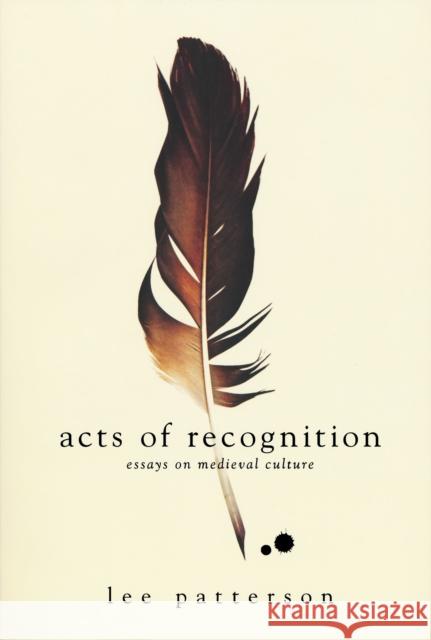Acts of Recognition: Essays on Medieval Culture » książka
Acts of Recognition: Essays on Medieval Culture
ISBN-13: 9780268038373 / Angielski / Miękka / 2009 / 368 str.
Acts of Recognition: Essays on Medieval Culture
ISBN-13: 9780268038373 / Angielski / Miękka / 2009 / 368 str.
(netto: 139,89 VAT: 5%)
Najniższa cena z 30 dni: 145,09
ok. 30 dni roboczych.
Darmowa dostawa!
This volume brings together Lee Patterson's essays published in various venues over the past twenty-seven years. As he observes in his preface, "The one persistent recognition that emerged from writing these otherwise quite disparate essays is that whatever the text . . . and whoever the people . . ., the values at issue remain central to contemporary life."
Two dialectics are at work in this book: that between the past and the present and that between the individual and the social, and both have moral significance. The first two chapters are methodological; the first is on the historical understanding of medieval literature and the second on how to manage the inseparability of fact and value in the classroom. The next three chapters take up three "less-read" late medieval writers: Sir John Clanvowe, Thomas Hoccleve, and John Lydgate. Each is used to illuminate a social phenomenon: the nature of court culture, the experience of the city, and Henry V's act of self-making. The following chapter explicitly links past and present by arguing that the bearing of the English aristocrat comes from a tradition beginning with Beowulf and later reinvoked in response to nineteenth-century imperialism. The next three chapters are the most literary, dealing with Chaucer and with literary conventions in relation to a number of texts. The final chapter is on the man Patterson considers one of the most important of our medieval ancestors, Francis of Assisi.
"This is a collection of essays published over the last twenty-seven years by an outstanding medievalist, one who has been exceptionally influential on medieval studies and whose work continues to be of the greatest importance. Patterson's collection is informed by a fascination with the ways in which the past inhabits the present. This collection of essays provide us with an eloquent, forceful demonstration of the hermeneutic potentials of liberal humanism in a committedly historicist mode. It will provide a timely, welcome, and stimulating challenge to the field." --David Aers, Duke University
""Acts of Recognition "offers us Lee Patterson at his best, as we've come to know his scholarship over the decades. Fearless, wide-ranging, and startling in the acuity of its insights, the volume reminds us why there is always something to learn from this superb thinker, whatever our critical approach or field. From the famous opening chapter on historical criticism to the luminous meditation on St. Francis that creates the book's 'sense of an ending, ' Patterson brilliantly shows us how the past continues part of us, always, and why it is not a foreign country but our home." --Geraldine Heng, University of Texas at Austin
"











